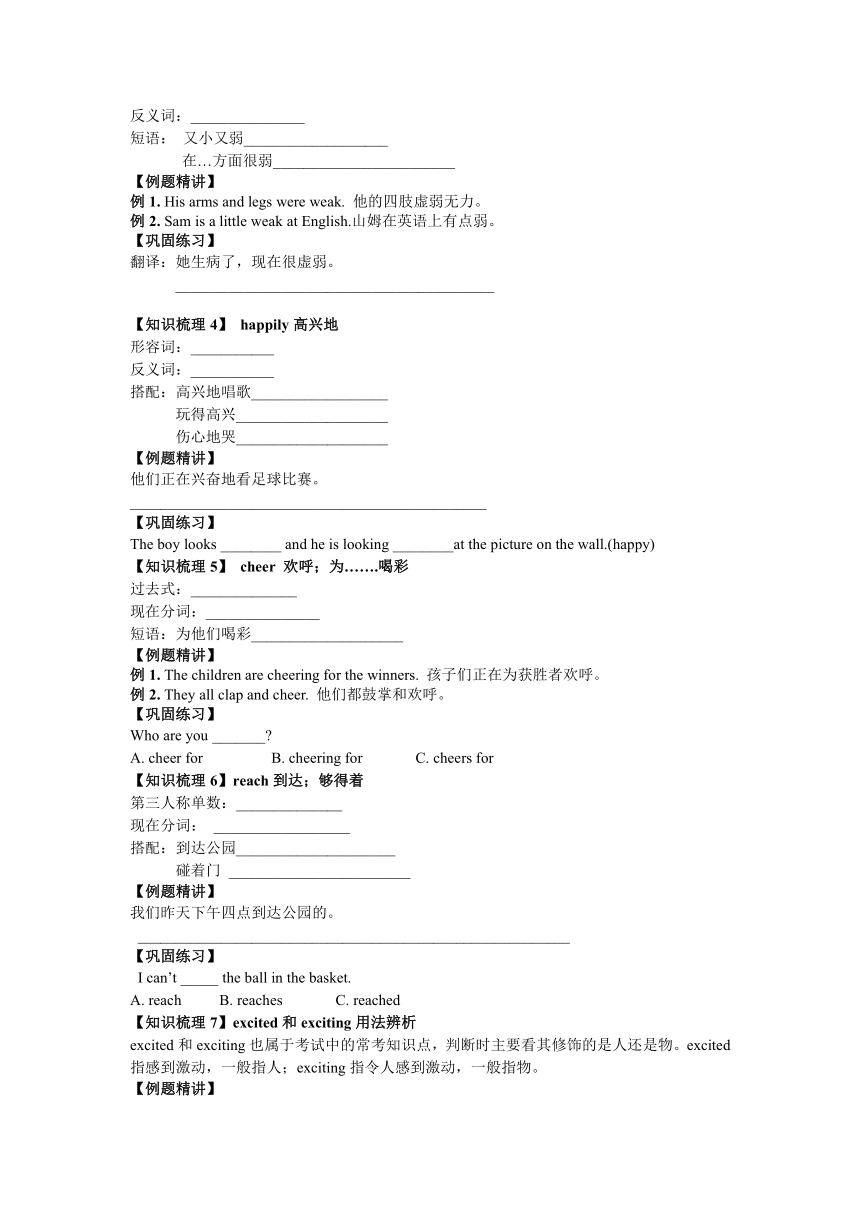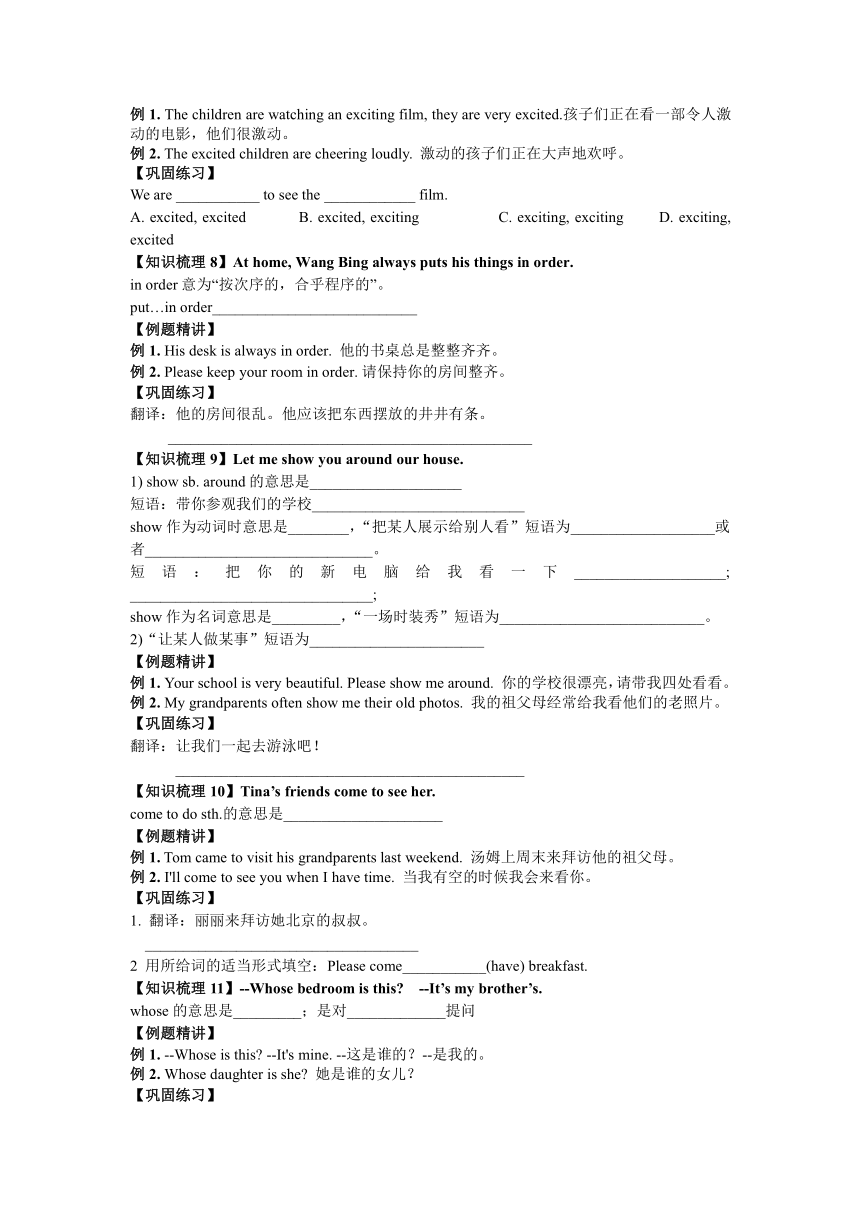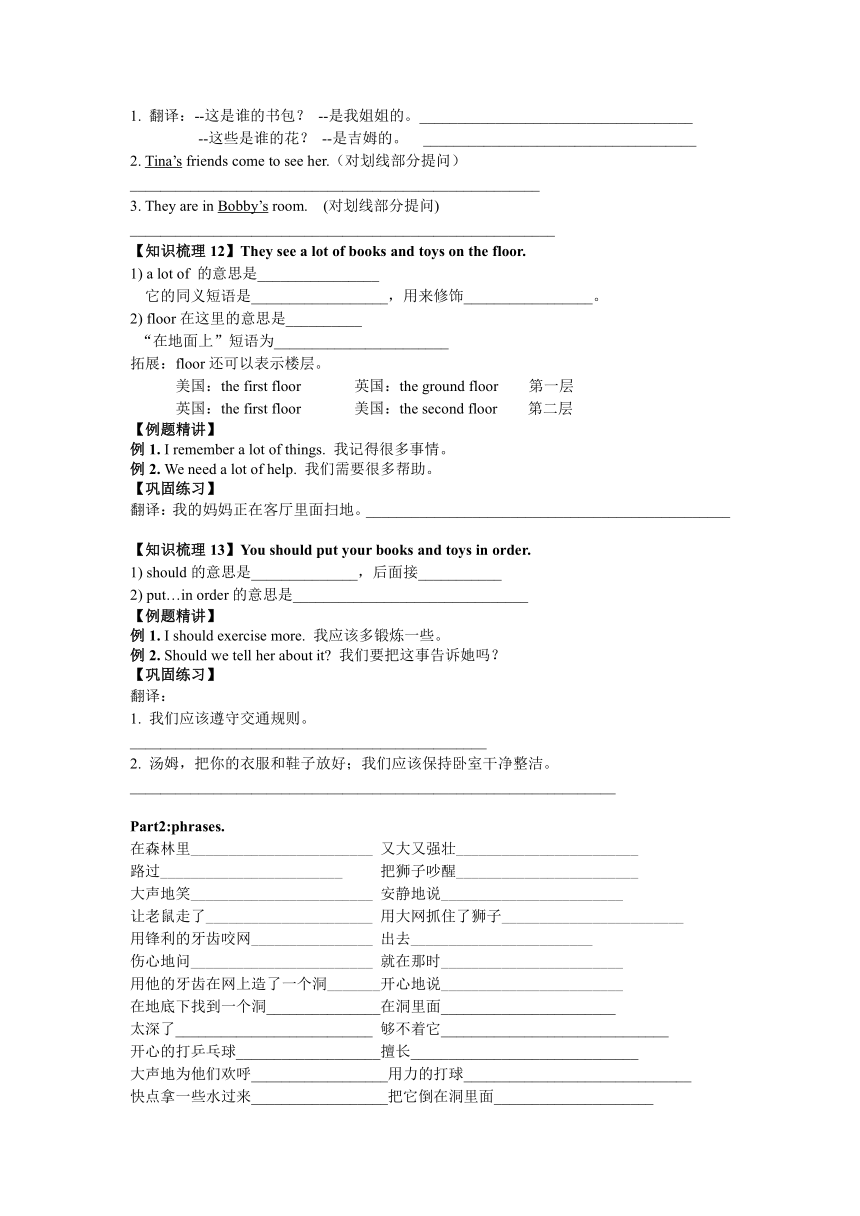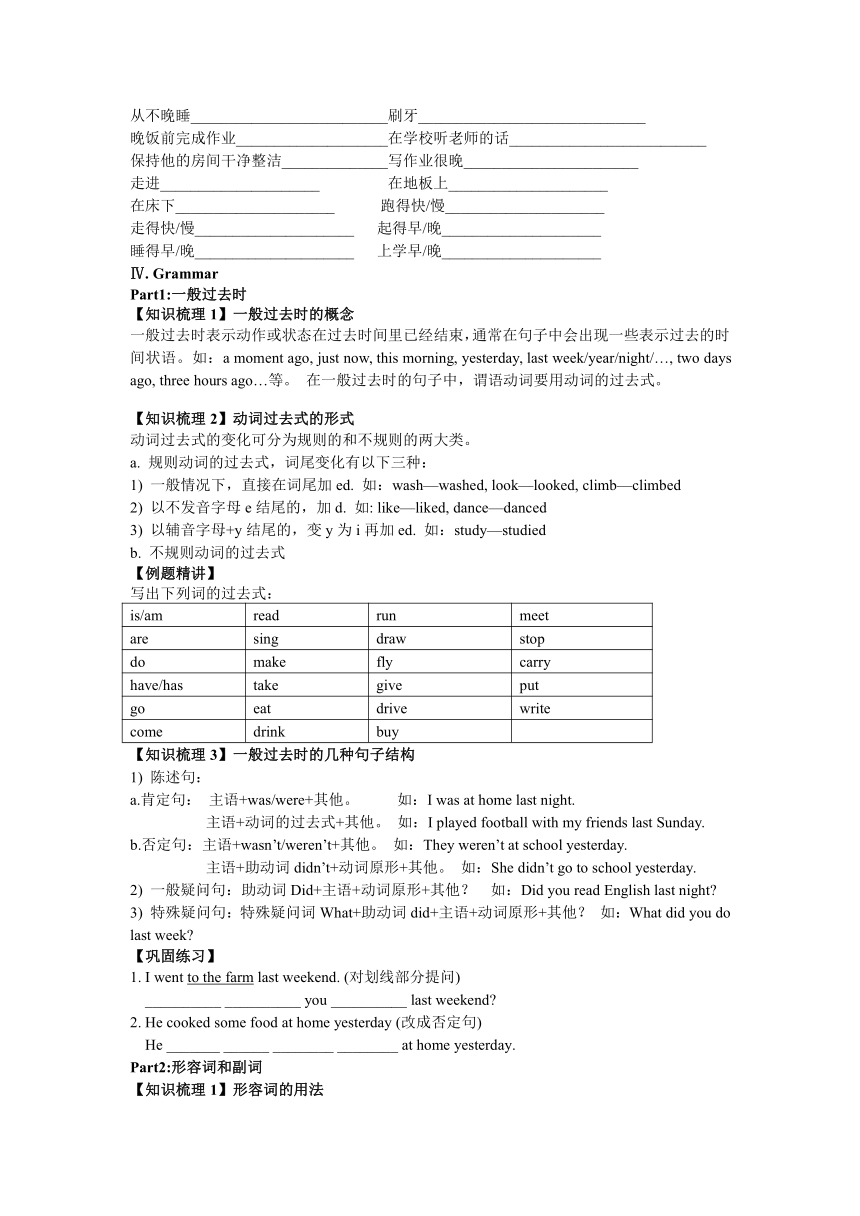牛津译林版六年级下册Unit 1-2 知识点详解讲义+练习(含答案)
文档属性
| 名称 | 牛津译林版六年级下册Unit 1-2 知识点详解讲义+练习(含答案) |  | |
| 格式 | docx | ||
| 文件大小 | 214.5KB | ||
| 资源类型 | 教案 | ||
| 版本资源 | 牛津译林版 | ||
| 科目 | 英语 | ||
| 更新时间 | 2024-06-02 14:43:24 | ||
图片预览





文档简介
六下U1-U2知识点复习
Teaching objectives 1.知识目标:掌握六上U1-U2的重点单词、词组。 2.技能目标:熟练运用一般过去时的用法; 3.情感目标:培养学生对小动物的兴趣。
Key points, Difficult points 1.掌握一般过去时的用法。 2.掌握形容词变副词的用法。
Teaching procedure:
Ⅰ. Lead-in:
Boys and girls, how much do you know about tigers and mice What can they do
Ⅱ.Language points:
Part1:Words.
【知识梳理1】 quietly 安静地,平静地
形容词:_________________
短语:安静地坐___________________
安静地走___________________
【例题精讲】
例1. Last night, my father went home late. He went into the living room quietly.昨晚爸爸晚回来。他安静地走进客厅。
例2. It’s time for class. Please be quiet.该是上课的时候了,请安静。
【巩固练习】
翻译:我的妈妈在星期日喜欢安静地在河边散步。
_________________________________________________________
【知识梳理2】 loudly高声地,吵闹地
形容词:____________
短语:大声地说_____________________
大声地唱_____________________
大声地笑_____________________
【例题精讲】
例1. Last Saturday, we sang loudly at David’s birthday party.上周六,我们在大卫的生日派对上大声地唱。
例2. Please don’t laugh loudly in public. It’s impolite.请不要在公共场合大笑,那是不礼貌的。
【巩固练习】
翻译:我们不应该在图书馆里大声地说话。
___________________________________________________
【知识梳理3】weak弱的;虚弱的
反义词:_______________
短语: 又小又弱___________________
在…方面很弱________________________
【例题精讲】
例1. His arms and legs were weak. 他的四肢虚弱无力。
例2. Sam is a little weak at English.山姆在英语上有点弱。
【巩固练习】
翻译:她生病了,现在很虚弱。
__________________________________________
【知识梳理4】 happily高兴地
形容词:___________
反义词:___________
搭配:高兴地唱歌__________________
玩得高兴____________________
伤心地哭____________________
【例题精讲】
他们正在兴奋地看足球比赛。
_______________________________________________
【巩固练习】
The boy looks ________ and he is looking ________at the picture on the wall.(happy)
【知识梳理5】 cheer 欢呼;为…….喝彩
过去式:______________
现在分词:_______________
短语:为他们喝彩____________________
【例题精讲】
例1. The children are cheering for the winners. 孩子们正在为获胜者欢呼。
例2. They all clap and cheer. 他们都鼓掌和欢呼。
【巩固练习】
Who are you _______
A. cheer for B. cheering for C. cheers for
【知识梳理6】reach到达;够得着
第三人称单数:______________
现在分词: __________________
搭配:到达公园_____________________
碰着门 ________________________
【例题精讲】
我们昨天下午四点到达公园的。
_________________________________________________________
【巩固练习】
I can’t _____ the ball in the basket.
A. reach B. reaches C. reached
【知识梳理7】excited和exciting用法辨析
excited和exciting也属于考试中的常考知识点,判断时主要看其修饰的是人还是物。excited指感到激动,一般指人;exciting指令人感到激动,一般指物。
【例题精讲】
例1. The children are watching an exciting film, they are very excited.孩子们正在看一部令人激动的电影,他们很激动。
例2. The excited children are cheering loudly. 激动的孩子们正在大声地欢呼。
【巩固练习】
We are ___________ to see the ____________ film.
A. excited, excited B. excited, exciting C. exciting, exciting D. exciting, excited
【知识梳理8】At home, Wang Bing always puts his things in order.
in order意为“按次序的,合乎程序的”。
put…in order___________________________
【例题精讲】
例1. His desk is always in order. 他的书桌总是整整齐齐。
例2. Please keep your room in order. 请保持你的房间整齐。
【巩固练习】
翻译:他的房间很乱。他应该把东西摆放的井井有条。
________________________________________________
【知识梳理9】Let me show you around our house.
1) show sb. around的意思是____________________
短语:带你参观我们的学校____________________________
show作为动词时意思是________,“把某人展示给别人看”短语为___________________或者______________________________。
短语:把你的新电脑给我看一下____________________; ________________________________;
show作为名词意思是_________,“一场时装秀”短语为___________________________。
2)“让某人做某事”短语为_______________________
【例题精讲】
例1. Your school is very beautiful. Please show me around. 你的学校很漂亮,请带我四处看看。
例2. My grandparents often show me their old photos. 我的祖父母经常给我看他们的老照片。
【巩固练习】
翻译:让我们一起去游泳吧!
______________________________________________
【知识梳理10】Tina’s friends come to see her.
come to do sth.的意思是_____________________
【例题精讲】
例1. Tom came to visit his grandparents last weekend. 汤姆上周末来拜访他的祖父母。
例2. I'll come to see you when I have time. 当我有空的时候我会来看你。
【巩固练习】
1. 翻译:丽丽来拜访她北京的叔叔。
____________________________________
2 用所给词的适当形式填空:Please come___________(have) breakfast.
【知识梳理11】--Whose bedroom is this --It’s my brother’s.
whose的意思是_________;是对_____________提问
【例题精讲】
例1. --Whose is this --It's mine. --这是谁的?--是我的。
例2. Whose daughter is she 她是谁的女儿?
【巩固练习】
1. 翻译:--这是谁的书包? --是我姐姐的。____________________________________
--这些是谁的花? --是吉姆的。 ____________________________________
2. Tina’s friends come to see her.(对划线部分提问)
______________________________________________________
3. They are in Bobby’s room. (对划线部分提问)
________________________________________________________
【知识梳理12】They see a lot of books and toys on the floor.
1) a lot of 的意思是________________
它的同义短语是__________________,用来修饰_________________。
2) floor在这里的意思是__________
“在地面上”短语为_______________________
拓展:floor还可以表示楼层。
美国:the first floor 英国:the ground floor 第一层
英国:the first floor 美国:the second floor 第二层
【例题精讲】
例1. I remember a lot of things. 我记得很多事情。
例2. We need a lot of help. 我们需要很多帮助。
【巩固练习】
翻译:我的妈妈正在客厅里面扫地。________________________________________________
【知识梳理13】You should put your books and toys in order.
1) should的意思是______________,后面接___________
2) put…in order的意思是_______________________________
【例题精讲】
例1. I should exercise more. 我应该多锻炼一些。
例2. Should we tell her about it 我们要把这事告诉她吗?
【巩固练习】
翻译:
我们应该遵守交通规则。
_______________________________________________
2. 汤姆,把你的衣服和鞋子放好;我们应该保持卧室干净整洁。
________________________________________________________________
Part2:phrases.
在森林里________________________ 又大又强壮________________________
路过________________________ 把狮子吵醒________________________
大声地笑________________________ 安静地说________________________
让老鼠走了______________________ 用大网抓住了狮子________________________
用锋利的牙齿咬网________________ 出去________________________
伤心地问________________________ 就在那时________________________
用他的牙齿在网上造了一个洞_______开心地说________________________
在地底下找到一个洞_______________在洞里面_______________________
太深了__________________________ 够不着它______________________________
开心的打乒乓球___________________擅长______________________________
大声地为他们欢呼__________________用力的打球______________________________
快点拿一些水过来__________________把它倒在洞里面_____________________
从不晚睡__________________________刷牙______________________________
晚饭前完成作业____________________在学校听老师的话__________________________
保持他的房间干净整洁______________写作业很晚_______________________
走进_____________________ 在地板上_____________________
在床下_____________________ 跑得快/慢_____________________
走得快/慢_____________________ 起得早/晚_____________________
睡得早/晚_____________________ 上学早/晚_____________________
Ⅳ. Grammar
Part1:一般过去时
【知识梳理1】一般过去时的概念
一般过去时表示动作或状态在过去时间里已经结束,通常在句子中会出现一些表示过去的时间状语。如:a moment ago, just now, this morning, yesterday, last week/year/night/…, two days ago, three hours ago…等。 在一般过去时的句子中,谓语动词要用动词的过去式。
【知识梳理2】动词过去式的形式
动词过去式的变化可分为规则的和不规则的两大类。
a. 规则动词的过去式,词尾变化有以下三种:
1) 一般情况下,直接在词尾加ed. 如:wash—washed, look—looked, climb—climbed
2) 以不发音字母e结尾的,加d. 如: like—liked, dance—danced
3) 以辅音字母+y结尾的,变y为i再加ed. 如:study—studied
b. 不规则动词的过去式
【例题精讲】
写出下列词的过去式:
is/am read run meet
are sing draw stop
do make fly carry
have/has take give put
go eat drive write
come drink buy
【知识梳理3】一般过去时的几种句子结构
1) 陈述句:
a.肯定句: 主语+was/were+其他。 如:I was at home last night.
主语+动词的过去式+其他。 如:I played football with my friends last Sunday.
b.否定句:主语+wasn’t/weren’t+其他。 如:They weren’t at school yesterday.
主语+助动词didn’t+动词原形+其他。 如:She didn’t go to school yesterday.
2) 一般疑问句:助动词Did+主语+动词原形+其他? 如:Did you read English last night
3) 特殊疑问句:特殊疑问词What+助动词did+主语+动词原形+其他? 如:What did you do last week
【巩固练习】
1. I went to the farm last weekend. (对划线部分提问)
__________ __________ you __________ last weekend
2. He cooked some food at home yesterday (改成否定句)
He _______ ______ ________ ________ at home yesterday.
Part2:形容词和副词
【知识梳理1】形容词的用法
形容词用来修饰名词,表示名词的属性;一般放在它所修饰的名词前。
例:a big garden an old picture
2、形容词也用来表示人或事物的性质、特征和状态,放在be动词和感官动词之后(如seem, sound)。
例:The ruler is long. The news sounds good.
【巩固练习】
1. There are many _____________ (高个子的男孩) in the class.
2. The apples on the desk are __________ (nice).
3. The idea sounds __________(great).
【知识梳理2】副词的用法
1.修饰动词(动名词或者分词)时,一般放在动词后面。
例:The women walked slowly.
My sister smiles sweetly.
2.修饰形容词,常置于形容词前面。
例:It is too late now and you should go home quickly.
Mike is a very funny boy, we all love him.
3.副词修饰副词,通常放在被修饰副词的前面。
例:He wrote very well.
Lucy jumped quite high at sport meeting yesterday.
批注:副词的用法可以概括为“动词之后,形副之前”。
【巩固练习】
1. Please listen to me _______________ (careful).
2. 翻译:今天太热了,所以我想吃一个冰淇淋。
_________________________________________________
【知识梳理3】形容词变副词
小学所涉及的形容词转化为副词主要包括两种:
1.一般情况下直接加ly,如:beautiful-beautifully
2.以y结尾的去y加ily。 如:heavy-heavily
【例题精讲】
例1. The beautiful girl dances beautifully.这个漂亮的女孩跳得很美。
例2. The rained was heavy._____________________ It rained heavily.雨下得大。
【巩固练习】
It rains ___________(heavy) outside, and we have to stay at home.
Ⅴ. Exercise
一、单项选择。
( )The little girl can’t find her parents , so she cried __________.
A.sad B. sadly C. happy D. happily
( )Mr. Green ________ a magazine ,then read it.
buy B. buys C. bought D. is buying
( )Long long ago, there _________ too _________ water in that river.
A.is ; much B.was ; much C.was ;many D.were ; many
( )A little boy pointed _________the king and laughed _________him.
A.at ; / B. /; / C./ ; at D.at ;at
( )---You look _________.What's the matter ---I lost my new kite.
A.sad B.sadly C.happy D.happily
( )The lion could not get _________ the net.
A.on B.up C.out D.out from
( )---Who _________ the tiger up ---The monkey did.
A. woke B.did wake C.wakes D.wake
( )Those aren’t ________ socks. ________ are my brother’s.
A.their; It B.my ;They C.your ; Them D.my ;He
( )I didn’t catch bus No.1 ________ I got up very late this morning.
A.when B.because C.after D.so
( )Nancy ________ the piano tomorrow.
A.play B.plays C.is playing D.will play
( )________ your mother tired every day
A.Are B.Is C.Do D.Does
( )________ the boy laugh ________
A.Did ; loudly B.Do ; loudly C.Does ; loud D. Is ; loudly
( )---Who ________ quietly ---The child did.
A.say B.says C.said D.saying
( )The girl is ________ beautiful.
A. / B.dance C.dances D.dancing
二、根据首字母提示完成句子。
Look, a cat is running after a m_________.
Shanghai is a l_________ city.
The lion is very s_________, and he has s_________ teeth.
The children are sleeping. Please say it q_________.
I’m not w_________. I’m strong.
I can’t g________ out. Please help me.
Yesterday, a dog b________ her.
They w________ by the supermarket and bought some fruit.
I want to know everything about you, please write to me s________.
The knife is very s________.
三、按要求改写句子。
The lion bit the net.(改为否定句)
_______________________________________
Su Hai woke her mother up yesterday morning.(对划线部分提问)
____________________________________________________________
3 Wang Bing always puts his things in order. (改为否定形式)
___________________________________________________
4 He didn’t finish his homework. (改为肯定形式)
___________________________________________________
5 He knows the students well. (改为一般疑问句)
___________________________________________________
]
四、根据中文或字母提示填空。
1 He has many good h__________.
2 Please put your things in o__________.
3 He never goes to bed l__________.
4 He also does w__________ at home .
5 The girl keeps her room clean and t__________.
6 This boy’s room is__________(凌乱) .
7 I’m not__________(瞌睡) .
8 He usually__________(完成) his homework late .
9 That’s a__________ (坏) habit.
10 He__________ (刷) his teeth in the morning .
五、根据中文提示完成句子。。
1.他在夜里很晚的时候做作业
He does his homework________ ________ ________.
2.他保持他的桌子干净整洁
He________ his table________ and________.
3.他有时在早上感到瞌睡
He ________ ________ ________ in the morning .
4.我很了解我的朋友
I ________ my friends ________ ________.
5.他通常在晚饭前完成作业
He ________ finishes his homework ________ ________.
Ⅱ.Language points:
Part1:Words.
【知识梳理1】
答案:quiet; sit quietly; walk quietly
答案:My mother likes walking quietly by the river on Sundays.
【知识梳理2】
答案:loud; speak loudly; sing loudly; laugh loudly
答案:We shouldn’t speak loudly in the library.
【知识梳理3】
答案:strong; small and weak; be weak in/at
答案:She is ill and she is weak now.
【知识梳理4】
答案:happy; sadly; sing happily; play happily; cry sadly
答案:They are watching the football match happily
答案:happy; happily
【知识梳理5】
答案:cheered; cheering; cheer for them[来
答案:B
【知识梳理6】
答案:reaches; reaching; reach the park; reach the door
答案:We reached the park at four yesterday afternoon.
答案:A
【知识梳理7】
答案:B
【知识梳理8】
答案:把…摆放的整齐
答案:His room is messy. He should put his things in order.
【知识梳理9】
答案:1) 带领某人参观某地;show you around our school;展示;show sb. sth.; show sth. to sb.;show your new computer to me;show me your new computer;展览;a fashion show;2) let sb do sth.
【知识梳理10】
答案:来做某事
答案:1. Lily comes to visit his uncle in Beijing. 2. to have
【知识梳理11】
答案:谁的;名词所有格(某人的)
答案:1. --Whose bag is this --It’s my sister’s. --Whose flowers are these --They’re Jim’s. 2. Whose friends come to see her 3. Whose room are they in
【知识梳理12】
答案:许多;lots of;可数名词或者不可数名词;地面;on the floor
【知识梳理13】
答案:应该;动词原形; 把…放整齐
答案:1. We should follow the traffic rules.
2. Tom, put your clothes and shoes in order; We should keep the bedroom clean and tidy.
Part2:phrases.
答案:in the forest; large and strong; walk by; wake the lion up; laugh loudly; say quietly; let the mouse go; catch the lion with a large net; bite the net with sharp teeth; get out; ask sadly; just then; make a hole in the net with his teeth; say happily; find a hole in the ground; in the hole; too deep; can’t reach it; play table tennis happily; be good at; cheer for them loudly; hit the ball hard; bring some water quickly; pour it into the hole never go to bed late; brush one’s teeth;finish one’s homework before dinner; listen to the teachers at school; keep his room clean and tidy; do one’s homework late; go into on the floor under the bed run fast/slowly walk fast/slowly get up early/ late go to bed early /late go to school early/late
Ⅳ. Grammar
答案: is/am—was, are—were, do—did, have/has—had, go—went, come—came, read—read, sing—sang, make—made, take—took, eat—ate, drink—drank, run—ran, draw—drew, fly—flew, give—gave, drive—drove, buy—bought, meet—met, stop—stopped, carry—carried, put—put, write—wrote.
【解析】对划线部分提问,首先根据划线部分找到特殊疑问词,划线部分为地点,所以用where,剩下的句子,无be动词,所以要用助动词did,后面went变为动词原形go。
【答案】Where; did; go
【解析】原句无be动词,不能直接在某一个词后加not,需要用助动词didn’t放在动词前,并且将动词过去式变为动词原形,注意剩下的句子若出现some,改为否定句要改为any。
【答案】didn’t cook any food
Part2:形容词和副词
答案:tall boys
答案:nice
答案:great
答案:carefully
答案:It’s too hot today, so I want to have an ice cream.
答案:heavily
Ⅴ. Exercise
答案:1-5 BCBDA 6-10 DABBD 11-14 BACD
答案:1. mouse 2. large 3.strong; sharp 4. quietly 5.weak 6.get 7.bit 8.walked 9.soon 10.sharp
答案:1.The lion didn’t bite the net. 2. Who woke her mother up yesterday morning 3.Wang Bing doesn’t always put his things in order. 4. He finished his homework. 5.Does he know the students well
答案:habits; order; late; well; tidy; messy; sleepy; finishes, bad; brushes
答案:1.late at night 2.keeps; clean; tidy 3.sometimes; feels sleepy 4.know; very; well 5.usually; before; dinner
Teaching objectives 1.知识目标:掌握六上U1-U2的重点单词、词组。 2.技能目标:熟练运用一般过去时的用法; 3.情感目标:培养学生对小动物的兴趣。
Key points, Difficult points 1.掌握一般过去时的用法。 2.掌握形容词变副词的用法。
Teaching procedure:
Ⅰ. Lead-in:
Boys and girls, how much do you know about tigers and mice What can they do
Ⅱ.Language points:
Part1:Words.
【知识梳理1】 quietly 安静地,平静地
形容词:_________________
短语:安静地坐___________________
安静地走___________________
【例题精讲】
例1. Last night, my father went home late. He went into the living room quietly.昨晚爸爸晚回来。他安静地走进客厅。
例2. It’s time for class. Please be quiet.该是上课的时候了,请安静。
【巩固练习】
翻译:我的妈妈在星期日喜欢安静地在河边散步。
_________________________________________________________
【知识梳理2】 loudly高声地,吵闹地
形容词:____________
短语:大声地说_____________________
大声地唱_____________________
大声地笑_____________________
【例题精讲】
例1. Last Saturday, we sang loudly at David’s birthday party.上周六,我们在大卫的生日派对上大声地唱。
例2. Please don’t laugh loudly in public. It’s impolite.请不要在公共场合大笑,那是不礼貌的。
【巩固练习】
翻译:我们不应该在图书馆里大声地说话。
___________________________________________________
【知识梳理3】weak弱的;虚弱的
反义词:_______________
短语: 又小又弱___________________
在…方面很弱________________________
【例题精讲】
例1. His arms and legs were weak. 他的四肢虚弱无力。
例2. Sam is a little weak at English.山姆在英语上有点弱。
【巩固练习】
翻译:她生病了,现在很虚弱。
__________________________________________
【知识梳理4】 happily高兴地
形容词:___________
反义词:___________
搭配:高兴地唱歌__________________
玩得高兴____________________
伤心地哭____________________
【例题精讲】
他们正在兴奋地看足球比赛。
_______________________________________________
【巩固练习】
The boy looks ________ and he is looking ________at the picture on the wall.(happy)
【知识梳理5】 cheer 欢呼;为…….喝彩
过去式:______________
现在分词:_______________
短语:为他们喝彩____________________
【例题精讲】
例1. The children are cheering for the winners. 孩子们正在为获胜者欢呼。
例2. They all clap and cheer. 他们都鼓掌和欢呼。
【巩固练习】
Who are you _______
A. cheer for B. cheering for C. cheers for
【知识梳理6】reach到达;够得着
第三人称单数:______________
现在分词: __________________
搭配:到达公园_____________________
碰着门 ________________________
【例题精讲】
我们昨天下午四点到达公园的。
_________________________________________________________
【巩固练习】
I can’t _____ the ball in the basket.
A. reach B. reaches C. reached
【知识梳理7】excited和exciting用法辨析
excited和exciting也属于考试中的常考知识点,判断时主要看其修饰的是人还是物。excited指感到激动,一般指人;exciting指令人感到激动,一般指物。
【例题精讲】
例1. The children are watching an exciting film, they are very excited.孩子们正在看一部令人激动的电影,他们很激动。
例2. The excited children are cheering loudly. 激动的孩子们正在大声地欢呼。
【巩固练习】
We are ___________ to see the ____________ film.
A. excited, excited B. excited, exciting C. exciting, exciting D. exciting, excited
【知识梳理8】At home, Wang Bing always puts his things in order.
in order意为“按次序的,合乎程序的”。
put…in order___________________________
【例题精讲】
例1. His desk is always in order. 他的书桌总是整整齐齐。
例2. Please keep your room in order. 请保持你的房间整齐。
【巩固练习】
翻译:他的房间很乱。他应该把东西摆放的井井有条。
________________________________________________
【知识梳理9】Let me show you around our house.
1) show sb. around的意思是____________________
短语:带你参观我们的学校____________________________
show作为动词时意思是________,“把某人展示给别人看”短语为___________________或者______________________________。
短语:把你的新电脑给我看一下____________________; ________________________________;
show作为名词意思是_________,“一场时装秀”短语为___________________________。
2)“让某人做某事”短语为_______________________
【例题精讲】
例1. Your school is very beautiful. Please show me around. 你的学校很漂亮,请带我四处看看。
例2. My grandparents often show me their old photos. 我的祖父母经常给我看他们的老照片。
【巩固练习】
翻译:让我们一起去游泳吧!
______________________________________________
【知识梳理10】Tina’s friends come to see her.
come to do sth.的意思是_____________________
【例题精讲】
例1. Tom came to visit his grandparents last weekend. 汤姆上周末来拜访他的祖父母。
例2. I'll come to see you when I have time. 当我有空的时候我会来看你。
【巩固练习】
1. 翻译:丽丽来拜访她北京的叔叔。
____________________________________
2 用所给词的适当形式填空:Please come___________(have) breakfast.
【知识梳理11】--Whose bedroom is this --It’s my brother’s.
whose的意思是_________;是对_____________提问
【例题精讲】
例1. --Whose is this --It's mine. --这是谁的?--是我的。
例2. Whose daughter is she 她是谁的女儿?
【巩固练习】
1. 翻译:--这是谁的书包? --是我姐姐的。____________________________________
--这些是谁的花? --是吉姆的。 ____________________________________
2. Tina’s friends come to see her.(对划线部分提问)
______________________________________________________
3. They are in Bobby’s room. (对划线部分提问)
________________________________________________________
【知识梳理12】They see a lot of books and toys on the floor.
1) a lot of 的意思是________________
它的同义短语是__________________,用来修饰_________________。
2) floor在这里的意思是__________
“在地面上”短语为_______________________
拓展:floor还可以表示楼层。
美国:the first floor 英国:the ground floor 第一层
英国:the first floor 美国:the second floor 第二层
【例题精讲】
例1. I remember a lot of things. 我记得很多事情。
例2. We need a lot of help. 我们需要很多帮助。
【巩固练习】
翻译:我的妈妈正在客厅里面扫地。________________________________________________
【知识梳理13】You should put your books and toys in order.
1) should的意思是______________,后面接___________
2) put…in order的意思是_______________________________
【例题精讲】
例1. I should exercise more. 我应该多锻炼一些。
例2. Should we tell her about it 我们要把这事告诉她吗?
【巩固练习】
翻译:
我们应该遵守交通规则。
_______________________________________________
2. 汤姆,把你的衣服和鞋子放好;我们应该保持卧室干净整洁。
________________________________________________________________
Part2:phrases.
在森林里________________________ 又大又强壮________________________
路过________________________ 把狮子吵醒________________________
大声地笑________________________ 安静地说________________________
让老鼠走了______________________ 用大网抓住了狮子________________________
用锋利的牙齿咬网________________ 出去________________________
伤心地问________________________ 就在那时________________________
用他的牙齿在网上造了一个洞_______开心地说________________________
在地底下找到一个洞_______________在洞里面_______________________
太深了__________________________ 够不着它______________________________
开心的打乒乓球___________________擅长______________________________
大声地为他们欢呼__________________用力的打球______________________________
快点拿一些水过来__________________把它倒在洞里面_____________________
从不晚睡__________________________刷牙______________________________
晚饭前完成作业____________________在学校听老师的话__________________________
保持他的房间干净整洁______________写作业很晚_______________________
走进_____________________ 在地板上_____________________
在床下_____________________ 跑得快/慢_____________________
走得快/慢_____________________ 起得早/晚_____________________
睡得早/晚_____________________ 上学早/晚_____________________
Ⅳ. Grammar
Part1:一般过去时
【知识梳理1】一般过去时的概念
一般过去时表示动作或状态在过去时间里已经结束,通常在句子中会出现一些表示过去的时间状语。如:a moment ago, just now, this morning, yesterday, last week/year/night/…, two days ago, three hours ago…等。 在一般过去时的句子中,谓语动词要用动词的过去式。
【知识梳理2】动词过去式的形式
动词过去式的变化可分为规则的和不规则的两大类。
a. 规则动词的过去式,词尾变化有以下三种:
1) 一般情况下,直接在词尾加ed. 如:wash—washed, look—looked, climb—climbed
2) 以不发音字母e结尾的,加d. 如: like—liked, dance—danced
3) 以辅音字母+y结尾的,变y为i再加ed. 如:study—studied
b. 不规则动词的过去式
【例题精讲】
写出下列词的过去式:
is/am read run meet
are sing draw stop
do make fly carry
have/has take give put
go eat drive write
come drink buy
【知识梳理3】一般过去时的几种句子结构
1) 陈述句:
a.肯定句: 主语+was/were+其他。 如:I was at home last night.
主语+动词的过去式+其他。 如:I played football with my friends last Sunday.
b.否定句:主语+wasn’t/weren’t+其他。 如:They weren’t at school yesterday.
主语+助动词didn’t+动词原形+其他。 如:She didn’t go to school yesterday.
2) 一般疑问句:助动词Did+主语+动词原形+其他? 如:Did you read English last night
3) 特殊疑问句:特殊疑问词What+助动词did+主语+动词原形+其他? 如:What did you do last week
【巩固练习】
1. I went to the farm last weekend. (对划线部分提问)
__________ __________ you __________ last weekend
2. He cooked some food at home yesterday (改成否定句)
He _______ ______ ________ ________ at home yesterday.
Part2:形容词和副词
【知识梳理1】形容词的用法
形容词用来修饰名词,表示名词的属性;一般放在它所修饰的名词前。
例:a big garden an old picture
2、形容词也用来表示人或事物的性质、特征和状态,放在be动词和感官动词之后(如seem, sound)。
例:The ruler is long. The news sounds good.
【巩固练习】
1. There are many _____________ (高个子的男孩) in the class.
2. The apples on the desk are __________ (nice).
3. The idea sounds __________(great).
【知识梳理2】副词的用法
1.修饰动词(动名词或者分词)时,一般放在动词后面。
例:The women walked slowly.
My sister smiles sweetly.
2.修饰形容词,常置于形容词前面。
例:It is too late now and you should go home quickly.
Mike is a very funny boy, we all love him.
3.副词修饰副词,通常放在被修饰副词的前面。
例:He wrote very well.
Lucy jumped quite high at sport meeting yesterday.
批注:副词的用法可以概括为“动词之后,形副之前”。
【巩固练习】
1. Please listen to me _______________ (careful).
2. 翻译:今天太热了,所以我想吃一个冰淇淋。
_________________________________________________
【知识梳理3】形容词变副词
小学所涉及的形容词转化为副词主要包括两种:
1.一般情况下直接加ly,如:beautiful-beautifully
2.以y结尾的去y加ily。 如:heavy-heavily
【例题精讲】
例1. The beautiful girl dances beautifully.这个漂亮的女孩跳得很美。
例2. The rained was heavy._____________________ It rained heavily.雨下得大。
【巩固练习】
It rains ___________(heavy) outside, and we have to stay at home.
Ⅴ. Exercise
一、单项选择。
( )The little girl can’t find her parents , so she cried __________.
A.sad B. sadly C. happy D. happily
( )Mr. Green ________ a magazine ,then read it.
buy B. buys C. bought D. is buying
( )Long long ago, there _________ too _________ water in that river.
A.is ; much B.was ; much C.was ;many D.were ; many
( )A little boy pointed _________the king and laughed _________him.
A.at ; / B. /; / C./ ; at D.at ;at
( )---You look _________.What's the matter ---I lost my new kite.
A.sad B.sadly C.happy D.happily
( )The lion could not get _________ the net.
A.on B.up C.out D.out from
( )---Who _________ the tiger up ---The monkey did.
A. woke B.did wake C.wakes D.wake
( )Those aren’t ________ socks. ________ are my brother’s.
A.their; It B.my ;They C.your ; Them D.my ;He
( )I didn’t catch bus No.1 ________ I got up very late this morning.
A.when B.because C.after D.so
( )Nancy ________ the piano tomorrow.
A.play B.plays C.is playing D.will play
( )________ your mother tired every day
A.Are B.Is C.Do D.Does
( )________ the boy laugh ________
A.Did ; loudly B.Do ; loudly C.Does ; loud D. Is ; loudly
( )---Who ________ quietly ---The child did.
A.say B.says C.said D.saying
( )The girl is ________ beautiful.
A. / B.dance C.dances D.dancing
二、根据首字母提示完成句子。
Look, a cat is running after a m_________.
Shanghai is a l_________ city.
The lion is very s_________, and he has s_________ teeth.
The children are sleeping. Please say it q_________.
I’m not w_________. I’m strong.
I can’t g________ out. Please help me.
Yesterday, a dog b________ her.
They w________ by the supermarket and bought some fruit.
I want to know everything about you, please write to me s________.
The knife is very s________.
三、按要求改写句子。
The lion bit the net.(改为否定句)
_______________________________________
Su Hai woke her mother up yesterday morning.(对划线部分提问)
____________________________________________________________
3 Wang Bing always puts his things in order. (改为否定形式)
___________________________________________________
4 He didn’t finish his homework. (改为肯定形式)
___________________________________________________
5 He knows the students well. (改为一般疑问句)
___________________________________________________
]
四、根据中文或字母提示填空。
1 He has many good h__________.
2 Please put your things in o__________.
3 He never goes to bed l__________.
4 He also does w__________ at home .
5 The girl keeps her room clean and t__________.
6 This boy’s room is__________(凌乱) .
7 I’m not__________(瞌睡) .
8 He usually__________(完成) his homework late .
9 That’s a__________ (坏) habit.
10 He__________ (刷) his teeth in the morning .
五、根据中文提示完成句子。。
1.他在夜里很晚的时候做作业
He does his homework________ ________ ________.
2.他保持他的桌子干净整洁
He________ his table________ and________.
3.他有时在早上感到瞌睡
He ________ ________ ________ in the morning .
4.我很了解我的朋友
I ________ my friends ________ ________.
5.他通常在晚饭前完成作业
He ________ finishes his homework ________ ________.
Ⅱ.Language points:
Part1:Words.
【知识梳理1】
答案:quiet; sit quietly; walk quietly
答案:My mother likes walking quietly by the river on Sundays.
【知识梳理2】
答案:loud; speak loudly; sing loudly; laugh loudly
答案:We shouldn’t speak loudly in the library.
【知识梳理3】
答案:strong; small and weak; be weak in/at
答案:She is ill and she is weak now.
【知识梳理4】
答案:happy; sadly; sing happily; play happily; cry sadly
答案:They are watching the football match happily
答案:happy; happily
【知识梳理5】
答案:cheered; cheering; cheer for them[来
答案:B
【知识梳理6】
答案:reaches; reaching; reach the park; reach the door
答案:We reached the park at four yesterday afternoon.
答案:A
【知识梳理7】
答案:B
【知识梳理8】
答案:把…摆放的整齐
答案:His room is messy. He should put his things in order.
【知识梳理9】
答案:1) 带领某人参观某地;show you around our school;展示;show sb. sth.; show sth. to sb.;show your new computer to me;show me your new computer;展览;a fashion show;2) let sb do sth.
【知识梳理10】
答案:来做某事
答案:1. Lily comes to visit his uncle in Beijing. 2. to have
【知识梳理11】
答案:谁的;名词所有格(某人的)
答案:1. --Whose bag is this --It’s my sister’s. --Whose flowers are these --They’re Jim’s. 2. Whose friends come to see her 3. Whose room are they in
【知识梳理12】
答案:许多;lots of;可数名词或者不可数名词;地面;on the floor
【知识梳理13】
答案:应该;动词原形; 把…放整齐
答案:1. We should follow the traffic rules.
2. Tom, put your clothes and shoes in order; We should keep the bedroom clean and tidy.
Part2:phrases.
答案:in the forest; large and strong; walk by; wake the lion up; laugh loudly; say quietly; let the mouse go; catch the lion with a large net; bite the net with sharp teeth; get out; ask sadly; just then; make a hole in the net with his teeth; say happily; find a hole in the ground; in the hole; too deep; can’t reach it; play table tennis happily; be good at; cheer for them loudly; hit the ball hard; bring some water quickly; pour it into the hole never go to bed late; brush one’s teeth;finish one’s homework before dinner; listen to the teachers at school; keep his room clean and tidy; do one’s homework late; go into on the floor under the bed run fast/slowly walk fast/slowly get up early/ late go to bed early /late go to school early/late
Ⅳ. Grammar
答案: is/am—was, are—were, do—did, have/has—had, go—went, come—came, read—read, sing—sang, make—made, take—took, eat—ate, drink—drank, run—ran, draw—drew, fly—flew, give—gave, drive—drove, buy—bought, meet—met, stop—stopped, carry—carried, put—put, write—wrote.
【解析】对划线部分提问,首先根据划线部分找到特殊疑问词,划线部分为地点,所以用where,剩下的句子,无be动词,所以要用助动词did,后面went变为动词原形go。
【答案】Where; did; go
【解析】原句无be动词,不能直接在某一个词后加not,需要用助动词didn’t放在动词前,并且将动词过去式变为动词原形,注意剩下的句子若出现some,改为否定句要改为any。
【答案】didn’t cook any food
Part2:形容词和副词
答案:tall boys
答案:nice
答案:great
答案:carefully
答案:It’s too hot today, so I want to have an ice cream.
答案:heavily
Ⅴ. Exercise
答案:1-5 BCBDA 6-10 DABBD 11-14 BACD
答案:1. mouse 2. large 3.strong; sharp 4. quietly 5.weak 6.get 7.bit 8.walked 9.soon 10.sharp
答案:1.The lion didn’t bite the net. 2. Who woke her mother up yesterday morning 3.Wang Bing doesn’t always put his things in order. 4. He finished his homework. 5.Does he know the students well
答案:habits; order; late; well; tidy; messy; sleepy; finishes, bad; brushes
答案:1.late at night 2.keeps; clean; tidy 3.sometimes; feels sleepy 4.know; very; well 5.usually; before; dinner
